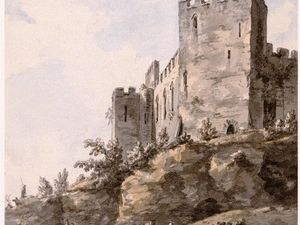Shropshire's prickly pals under threat of extinction
Hedgehogs might look safe enough as they shuffle around in the undergrowth.
But the animals are dying out and are in real danger of becoming extinct in some areas in the next few years, according to wildlife experts including TV presenter Michaela Strachan.
The Springwatch presenter hit the headlines when she said more work needed to be done to save our spiky mammals and claimed they were disappearing as fast as tigers.
Blame for the decline of the creatures has been laid at the door of pesticides, predators and loss of habitat.
Conservationists in Shropshire today joined forces to remind people hedgehogs are under threat.
There are thought to be less than one million hedgehogs currently living in Britain. This comes after a 37 per cent decline in numbers during the decade from 2003 to 2013.
A report by the RSPB revealed one in five people had never seen a hedgehog in their garden and that only a quarter of those who do, see them regularly.
Campaigners say that leaving hedges and bushes in gardens and open spaces would provide cover for hedgehogs as well as piles of woods and sticks for them to climb into.
Claire Evans and the staff at Cuan Wildlife Centre in Much Wenlock work tirelessly to return sick or injured animals back to the wild.
The 24-hour centre backed the campaign to save Britain's hedgehogs.
Ms Evans said: "Why not build or buy a hedgehog house? Ideally it needs to be in a quiet, slightly overgrown area where it won't be disturbed. If it is left quiet you may be lucky enough to have a resident. Hedgehogs are nocturnal; if you see one in the day time please ring us or your local wildlife rescue centre straight away – there is nearly always a problem if it is out in the daytime."
The British Hedgehog Preservation Society (BHPS), which is based in Ludlow, also urged people to do their bit to help save the hedgehog.
Fay Vass, chief executive of BHPS, said: "Hedgehogs have hit the news this week following comments from Michaela Strachan that they will be extinct in 10 years.
"We are pleased that Michaela has taken up the plight of the hedgehog, and agree that hedgehogs are certainly in decline, but insist that extinction is not imminent.
"Everyone has a soft spot for hedgehogs; they are among our most familiar and easily recognisable wild animals. Yet many suffer heavily from the dangers of modern life, to which they are not adjusted. Mowers, strimmers, poisons, dogs and massive loss of habitat in the countryside all threaten the continued survival of hedgehogs in many areas."
Stuart Edmunds, of Shropshire Wildlife Trust, said : "The national hedgehog population has declined nationally from about 30 million in the 1950s to around one million now.
"There are lots of factors such as more traffic on roads, causing more hogs to be run over and hedgehogs can also be poisoned accidentally by the chemicals in slug pellets, which are used more commonly in gardens these days."
For help in dealing with a hedgehog casualty or for more information on the British Hedgehog Preservation Society call (01584) 890801 or Cuan Wildlife Centre on (01952) 728070.





